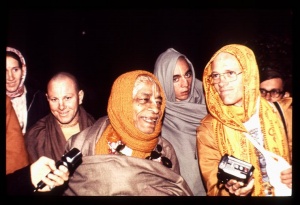SB 3.22.28: Difference between revisions
m (1 revision(s)) |
(Vanibot #0054 edit - transform synonyms into clickable links, which search similar occurrences) |
||
| (One intermediate revision by one other user not shown) | |||
| Line 1: | Line 1: | ||
{{info | {{info | ||
|speaker=Maitreya | |speaker=Maitreya Ṛṣi | ||
|listener=Vidura | |listener=Vidura | ||
}} | }} | ||
[[Category:Srimad-Bhagavatam - Canto 03 Chapter 22]] | |||
[[Category:Bhagavatam Verses Spoken by Maitreya Rsi - Vanisource|032228]] | |||
<div style="float:left">'''[[Srimad-Bhagavatam]] - [[SB 3|Third Canto]] - [[SB 3.22: The Marriage of Kardama Muni and Devahuti|Chapter 22: The Marriage of Kardama Muni and Devahūti]]'''</div> | |||
<div style="float:right">[[File:Go-previous.png|link=SB 3.22.26-27]] '''[[SB 3.22.26-27]] - [[SB 3.22.29-30]]''' [[File:Go-next.png|link=SB 3.22.29-30]]</div> | |||
{{RandomImage}} | |||
==== TEXT 28 ==== | ==== TEXT 28 ==== | ||
<div | <div class="verse"> | ||
tam āyāntam abhipretya | :tam āyāntam abhipretya | ||
brahmāvartāt prajāḥ patim | :brahmāvartāt prajāḥ patim | ||
gīta-saṁstuti-vāditraiḥ | :gīta-saṁstuti-vāditraiḥ | ||
pratyudīyuḥ praharṣitāḥ | :pratyudīyuḥ praharṣitāḥ | ||
</div> | </div> | ||
| Line 16: | Line 22: | ||
==== SYNONYMS ==== | ==== SYNONYMS ==== | ||
<div | <div class="synonyms"> | ||
''[//vanipedia.org/wiki/Special:VaniSearch?s=tam&tab=syno_o&ds=1 tam]'' — him; ''[//vanipedia.org/wiki/Special:VaniSearch?s=āyāntam&tab=syno_o&ds=1 āyāntam]'' — who was arriving; ''[//vanipedia.org/wiki/Special:VaniSearch?s=abhipretya&tab=syno_o&ds=1 abhipretya]'' — knowing of; ''[//vanipedia.org/wiki/Special:VaniSearch?s=brahmāvartāt&tab=syno_o&ds=1 brahmāvartāt]'' — from Brahmāvarta; ''[//vanipedia.org/wiki/Special:VaniSearch?s=prajāḥ&tab=syno_o&ds=1 prajāḥ]'' — his subjects; ''[//vanipedia.org/wiki/Special:VaniSearch?s=patim&tab=syno_o&ds=1 patim]'' — their lord; ''[//vanipedia.org/wiki/Special:VaniSearch?s=gīta&tab=syno_o&ds=1 gīta]-[//vanipedia.org/wiki/Special:VaniSearch?s=saṁstuti&tab=syno_o&ds=1 saṁstuti]-[//vanipedia.org/wiki/Special:VaniSearch?s=vāditraiḥ&tab=syno_o&ds=1 vāditraiḥ]'' — with songs, praise and instrumental music; ''[//vanipedia.org/wiki/Special:VaniSearch?s=pratyudīyuḥ&tab=syno_o&ds=1 pratyudīyuḥ]'' — came forward to greet; ''[//vanipedia.org/wiki/Special:VaniSearch?s=praharṣitāḥ&tab=syno_o&ds=1 praharṣitāḥ]'' — overjoyed. | |||
</div> | </div> | ||
| Line 23: | Line 29: | ||
==== TRANSLATION ==== | ==== TRANSLATION ==== | ||
<div | <div class="translation"> | ||
Overjoyed to know of his arrival, his subjects came forth from Brahmāvarta to greet their returning lord with songs, prayers and musical instruments. | Overjoyed to know of his arrival, his subjects came forth from Brahmāvarta to greet their returning lord with songs, prayers and musical instruments. | ||
</div> | </div> | ||
| Line 30: | Line 36: | ||
==== PURPORT ==== | ==== PURPORT ==== | ||
<div | <div class="purport"> | ||
It is the custom of the citizens of a kingdom's capital to receive the king when he returns from a tour. There is a similar description when Kṛṣṇa returned to Dvārakā after the Battle of Kurukṣetra. At that time He was received by all classes of citizens at the gate of the city. Formerly, capital cities were surrounded by walls, and there were different gates for regular entrance. Even in Delhi today there are old gates, and some other old cities have such gates where citizens would gather to receive the king. Here also the citizens of Barhiṣmatī, the capital of Brahmāvarta, the kingdom of Svāyambhuva, came nicely dressed to receive the Emperor with decorations and musical instruments. | It is the custom of the citizens of a kingdom's capital to receive the king when he returns from a tour. There is a similar description when Kṛṣṇa returned to Dvārakā after the Battle of Kurukṣetra. At that time He was received by all classes of citizens at the gate of the city. Formerly, capital cities were surrounded by walls, and there were different gates for regular entrance. Even in Delhi today there are old gates, and some other old cities have such gates where citizens would gather to receive the king. Here also the citizens of Barhiṣmatī, the capital of Brahmāvarta, the kingdom of Svāyambhuva, came nicely dressed to receive the Emperor with decorations and musical instruments. | ||
</div> | </div> | ||
__NOTOC__ | |||
<div style="float:right; clear:both;">[[File:Go-previous.png|link=SB 3.22.26-27]] '''[[SB 3.22.26-27]] - [[SB 3.22.29-30]]''' [[File:Go-next.png|link=SB 3.22.29-30]]</div> | |||
__NOTOC__ | |||
__NOEDITSECTION__ | |||
Latest revision as of 21:42, 17 February 2024

A.C. Bhaktivedanta Swami Prabhupada
TEXT 28
- tam āyāntam abhipretya
- brahmāvartāt prajāḥ patim
- gīta-saṁstuti-vāditraiḥ
- pratyudīyuḥ praharṣitāḥ
SYNONYMS
tam — him; āyāntam — who was arriving; abhipretya — knowing of; brahmāvartāt — from Brahmāvarta; prajāḥ — his subjects; patim — their lord; gīta-saṁstuti-vāditraiḥ — with songs, praise and instrumental music; pratyudīyuḥ — came forward to greet; praharṣitāḥ — overjoyed.
TRANSLATION
Overjoyed to know of his arrival, his subjects came forth from Brahmāvarta to greet their returning lord with songs, prayers and musical instruments.
PURPORT
It is the custom of the citizens of a kingdom's capital to receive the king when he returns from a tour. There is a similar description when Kṛṣṇa returned to Dvārakā after the Battle of Kurukṣetra. At that time He was received by all classes of citizens at the gate of the city. Formerly, capital cities were surrounded by walls, and there were different gates for regular entrance. Even in Delhi today there are old gates, and some other old cities have such gates where citizens would gather to receive the king. Here also the citizens of Barhiṣmatī, the capital of Brahmāvarta, the kingdom of Svāyambhuva, came nicely dressed to receive the Emperor with decorations and musical instruments.